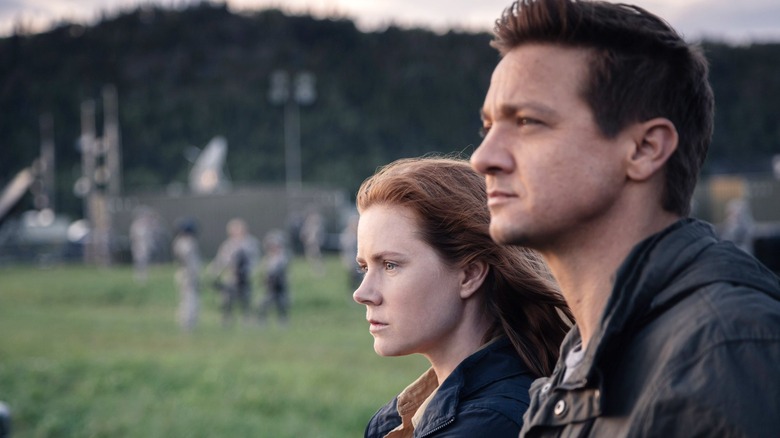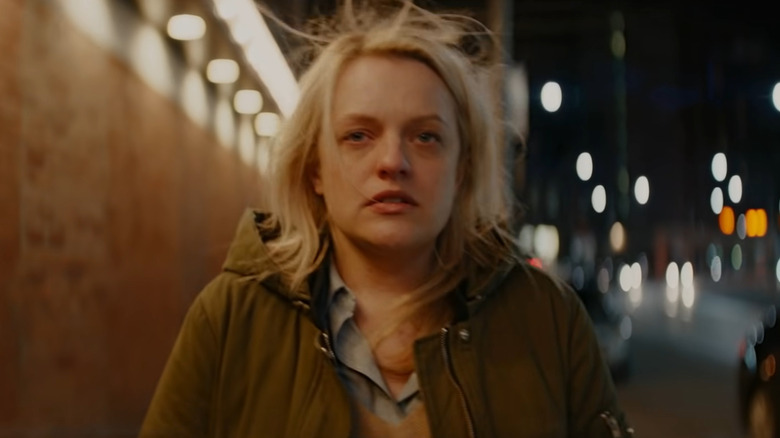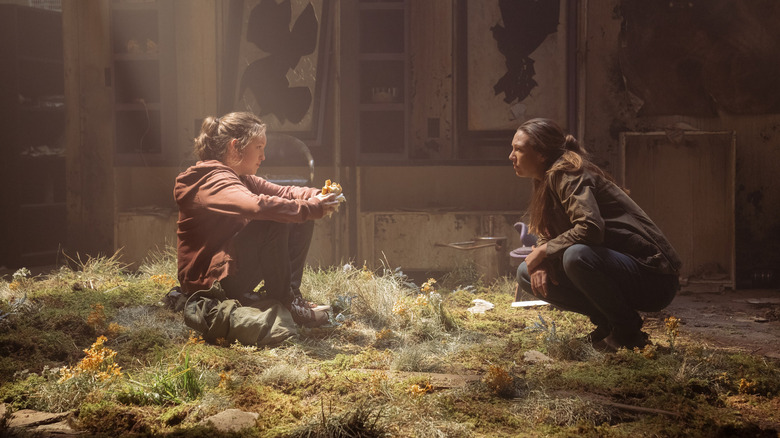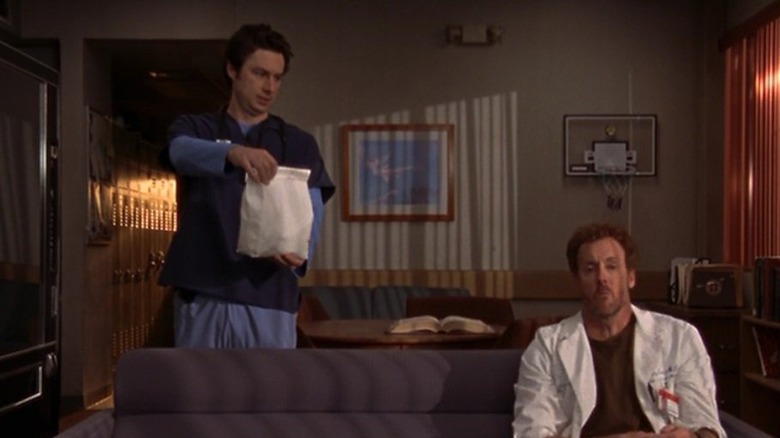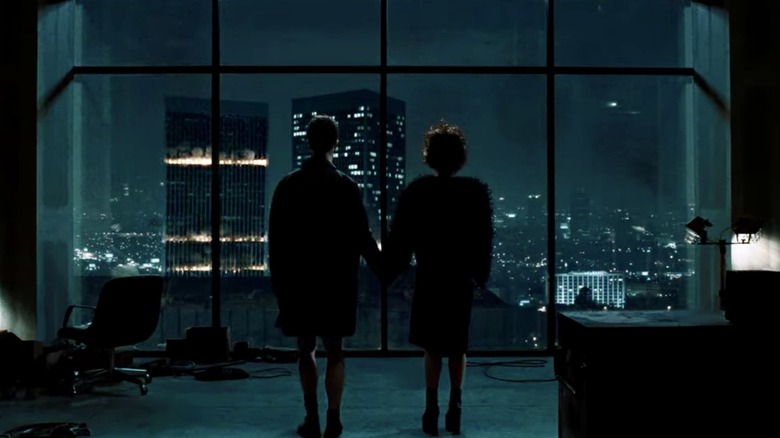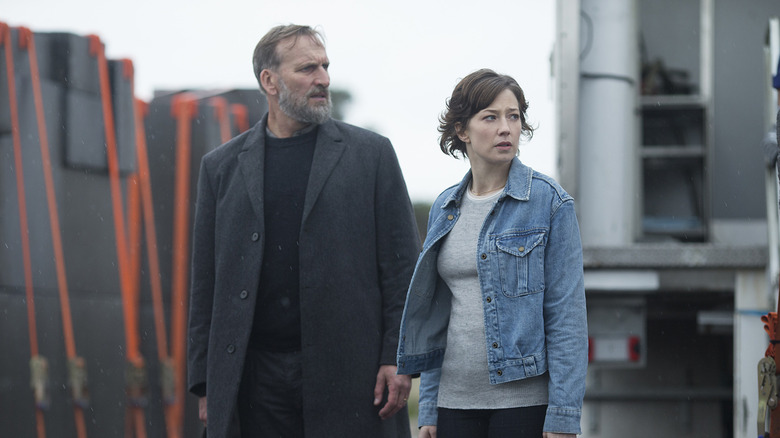The Saddest Scene In Last Night's The Last Of Us Uses A Familiar Score
This post contains spoilers for the latest episode of "The Last of Us."
Fans of the videogame knew, going into the Bill-centric episode of "The Last of Us," that we were in a for a sad time. We just didn't expect things to be this sad. It turns out Nick Offerman is an incredibly convincing crier; he gives a great depiction of a heartbroken Bill as the love of his life Frank (Murray Bartlet) tells him he wants to die. Frank knows that his illness is only going to get worse, and he wants Bill to help him die on his own terms. Before that, however, the two spend one final day together.
It's a far kinder depiction of their relationship than we get in the game, and the montage of Bill and Frank going about their final day is devastating. Some of that's simply because we've gotten to spend more time with the characters, but it's mainly because of how the scene reminds us that everything comes to an end. Even if you've successfully executed the perfect plan for surviving the apocalypse, you're still going to die eventually.
Or maybe the reason the scene's so affecting is because, as we watch Bill and Frank go about their final day on this earth together, "The Last of Us" treats us to some truly haunting background music, with those violin chords sweeping in and out. The song feels like what Bill's going through; it's both a celebration of life and a mourning of life's inevitable end. If it sounded familiar to you, that's because you've probably already heard it. A lot.
A familiar tune
It's called "On the Nature of Daylight." Perhaps its most famous cinematic use — at least, the one that stuck to me the most — is its appearance in the final minutes of "Arrival." The thoughtful sci-fi film's final moments would be deeply emotional no matter what background music it uses, but "On the Nature of Daylight" elevates it to a whole other level.
This was the first time I'd heard the song, so I was surprised when I looked it up later and found that it wasn't part of the rest of the movie's soundtrack. The score for "Arrival" was composed by Jóhann Jóhannsson (who also composed the scores for films like "The Theory of Everything," "Sicario," and "Prisoners"), but this particular song was taken from Max Richter's album "The Blue Notebooks," which was released back in 2004. The use of the song disqualified "Arrival" from the "Best Original Score" category at the Oscars, but it was worth it.
Ever since then, I'll often find myself watching a movie and be taken aback by the sudden sound of the song's familiar opening notes. I'll be watching "Shutter Island," or "Stranger than Fiction," or season 4 of "The Handmaid's Tale," and there it is. (Some other notable appearances are "Disconnect" and "The Face of an Angel," and there's plenty more examples to choose from.) The song shows up all over the place, and the moment you hear it in a movie, you should buckle up — you're about to be moved to your very core.
Sad yet strangely peaceful
The "Handmaid's Tale" example is noteworthy because it's not even the first time Elisabeth Moss was asked to act her heart out while this song played in the background. She was also in the song's official music video in 2018, playing an unnamed woman as she hangs up from an unheard phone call. She then goes on a long quiet walk across the city at night, into the morning, seeming upset about something but still keeping it all together. Then, when she's alone and has to climb up a few sets of stairs, she breaks down in tears as the music hits its crescendo.
It's a simple video, one that really demonstrates how much strength the song carries. We don't need to know why this person is upset; Moss's acting and the music is all we need to buy that silent breakdown by the staircase. Watching it, there's no need to wonder why movies and shows wait until the saddest, most emotional part of the story to play this song; that's exactly the kind of scene it's good for.
It's a particularly fitting song to use in "The Last of Us," because the album it's from was written in response to world events going down in 2003. "On the Nature of Daylight" is, at least partly, a reflection of what Max Richter felt as he watched the invasion of Iraq begin despite his (and millions of others') insistence that it was a terrible idea. 2003 is the year where society breaks down in "The Last of Us," the last period of normal civilization that Bill or Frank have to remember. On paper, I should have no complaints about the use of Richter's best song in last night's episode; it fits like a glove.
But it's kind of cheating, isn't it?
Yet, by the time I watched episode 3 of "The Last of Us," I had heard "On the Nature of Daylight" so many times in so many movies and shows that it broke my immersion. From those first notes, I understood exactly what was about to happen and exactly what the show wanted me to feel, and that undermined it a little. Was I still moved by the sequence? Yes, but only after a few seconds of annoyance, and a few seconds of me accepting that yes, yet another show is using that song again.
It reminded me of one stand-up comedian's complaints about jump-scares: "Horror movies with jump scares are like if a comedian went into the audience and tickled everyone. 'Technically you laughed! I'm funny!'" While I myself have no qualms about the occasional well-timed jump scare in a good spooky movie, there's definitely some truth here. It's easy to scare someone just by having something pop up out of nowhere, accompanied by a sudden loud noise. Horror films that make an actual impact, the ones that stick with you long after the credits roll, are the ones that don't rely on those kinds of gimmicks.
To an extent, music like "On the Nature of Daylight" is the sad story equivalent to the horror movie's jump scare. It's a quick and easy way to get audiences emotional, regardless of whether the script or performance actually hold up. Luckily, both of those things do hold up here, but the more this song is used in popular media, the more likely it is that general audiences will recognize the song, and the more likely they'll feel like they're being manipulated.
The Fray-itis
Max Richter is far from the only artist whose had his work overused. One of the best episodes of "Scrubs" ended with a sad sequence of patients dying and Dr. Cox being distraught, with The Fray's "How to Save a Life" playing over it. It's a great episode, undermined slightly by the fact that another hospital show, "Grey's Anatomy" had already used the song, multiple times. Throughout the 2000s, the song would also feature on "One Tree Hill," "Cold Case," "Conviction," and God knows what else. The use of the song in "Scrubs" was understandable when the episode first aired in 2005, but when you watch it now, the scene's not quite as effective.
The scene in "Scrubs" is also a little awkward with the way the episode transitions to it. One moment we're in a low-stakes scene where the episode's disconnected B-story with The Todd is wrapping up on a light-hearted note; the next moment, "How to Save a Life" is blasting at full volume as Dr. Cox has a devastating mental breakdown. It's a jarring tonal shift. Luckily the writing and performances are again good enough to sell the scene, but it's hard to escape how manipulative the use of the song now feels, especially with the suddenness with which it's thrust upon us.
You may say its unfair to criticize "Scrubs" for using a song that hadn't yet been fully run into the ground, but that brings us to the next point...
Retroactively harming other movies and shows
Maybe the worst part of movies/shows reusing songs too much is the way it taints everything before it. When "Fight Club" ended with "Where is My Mind?" by the Pixies back in 1999, it was awesome. But if you're watching the movie for the first time in 2023, you've probably already seen some version of the song played in "The Leftovers" or "Veronica Mars" or "Criminal Minds" or "Mr. Robot" or "Malignant" or "Sucker Punch" or "Observe and Report" or "It's Kind of a Funny Story," or half the other movies where the main character's sanity is in doubt.
The "Fight Club" ending is still great, but it isn't quite as cool as it once was. Because all those later directors and music supervisors couldn't help themselves from using such a fun song, most modern viewers watching "Fight Club" for the first time will always be slightly taken out of it at the ending when the Pixies start playing. Whether they're conscious of it or not, a little part of the viewer will be thinking, "Hey, this is just like in that other movie." This isn't a huge deal, of course; no movie or show exists in a vacuum, and there will always be moments within it that remind the viewer of something else they saw. But the more a song gets used in popular media, the less power the song has, and it's not just the new shows and movies that are undermined by it.
But then again...
Sometimes the music is legitimately so good that none of this really matters. Fans of "The Leftovers" know this in their bones: that show struck gold with "The Departure" and they knew it straight away, so it basically threw the score into every single episode — with some variations, of course. Most fans never got sick of it, even after three seasons, because it was used well and it was never introduced into a scene in a jarring way.
The soundtrack for this show was, unsurprisingly, also composed by Max Richter. Although they never used "In the Nature of the Daylight," a lot of the music — like November or Dona Nobis Pacem — feel reminiscent of it, and they never got old either. Richter's composed a lot of soundtracks over the years, and you can usually tell it's him without even checking, yet that never seems to undermine the show/movie in question.
So on one hand, maybe it's time to give "On the Nature of Daylight" a rest, just like we finally put "How to Save a Life" to rest back in the early 2010s. While "Daylight" is a great song that's been used well countless times, "The Last of Us" may have taken us into one-too-many territory.
But on the other hand, maybe it's one of those tunes that's so good it's worth the trouble. Frank and Bill's final day together is still genuinely moving even if you recognize the score, to the point where I almost feel bad about pointing out how unoriginal the music choice was. Perhaps for Max Richter, and maybe only for Max Richter, the one-too-many territory doesn't exist.

